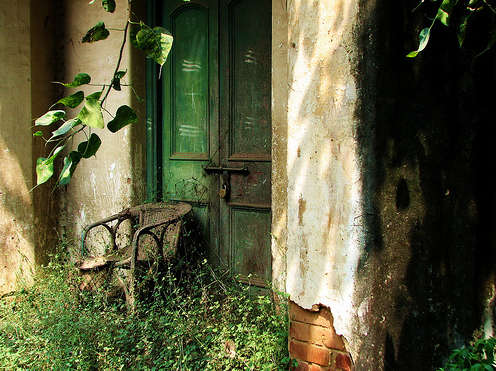FWP:
SETS
DESERT: {3,1}
HOME: {14,9}
SPRINGTIME: {13,2}
The original closing-verse of this ghazal was {156,3x}, which used 'Asad' rather than 'Ghalib'.
The first line, in classic mushairah performance style, suggests a melancholy reflection that seems likely to be followed in the second line by something about time, death, the lover's fate, or the human condition. But instead, after the obligatory suspense-creating delay, the second line offers an amusing sense of ruefulness: what a waste, that here the speaker is, miles from home, and only now, in his absence, is his house verdant and flourishing! Here, the lover thinks, is a fine irony. But of course, to the audience a much greater irony is also apparent: that the lover's notion of 'springtime' and 'verdancy' consists of the house becoming such a wreck that it's overgrown with weeds and returning to a wilderness state --joining its owner, in a sense.
For other home-versus-desert verses, see {17,2} . An amusing one is {10,7}, in which the grass growing in the house is sufficient to provide a living for the Doorkeeper. A more complex one is {35,8}, a brilliant verse that proposes a whole range of possible relationships between home and desert.
But I'd also like to add some verses that suggest a different line of interpretation. In {18,3} the desert
seems to be invoked as Majnun's
'home': he's a 'desert-wanderer', he's to be found by wilderness-roaming,
and his house is 'doorless'. (Think also of {127,2},
which proposes the making of a 'without-door-and-walls-ish' house.) But the
clearest proof is {140,6}, in which beyond
all doubt the wilderness is Majnun's 'house' [makān].
So it's possible to read the lover here as similarly mad, a similar desert-wanderer
who considers the wilderness his 'house'. It's springtime, the desert grasses
and plants have sprung up for their brief season in the sun. The mad lover
considers that his wilderness 'house' is now flourishing, with its 'door and
walls' decked out in greenery. Even in the 'waterless' [be-āb] desert [bayābāñ], he's able to envision himself as having a lively,
seasonally decorated house. Who could ask for more? It's a secondary reading no doubt, but ... muft hāth āʾe to burā kyā hai (cf. {162,11}).

Nazm:
In madness, desolation and wilderness are pleasing. When the house was not desolate, then he left it and came away into the desert. But so much time has passed in desert-wandering that the house has become desolate-- to such an extent that grass has grown up on the door and walls. Now the heart desires to see this garden-house. In this verse there's no excellence of expression or rhetoric [badīʿ], but in very clear plain words he has captured such a picture of madness that it has no peer. (167-68)
== Nazm page 167; Nazm page 168